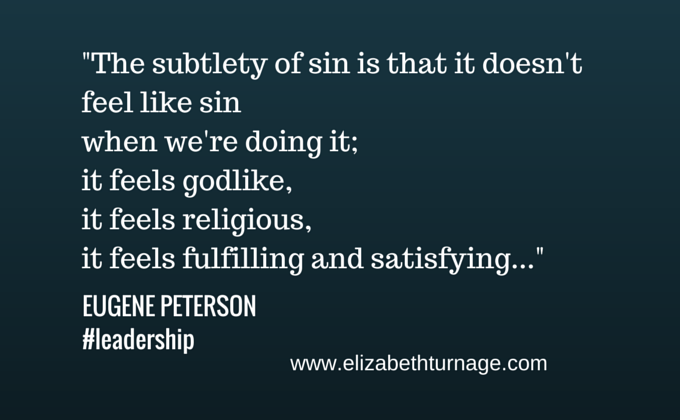
Eugene Peterson: Words for When Leaders Fail Us
How do we respond when leaders fail?
This week, when the news reached me that Eugene Peterson, pastor and translator of The Message translation of the Bible, had made some seemingly uncharacteristic remarks, I remembered a time a few years ago when I was struggling over the moral failure of a pastor I had read and respected. At that time, I turned to Eugene Peterson’s writing on leaders to re-orient my thinking.
Here is what I wrote then:
I, as many others, have been struggling this week with how to respond to the resignation of the well-known and respected preacher due to “moral failure.” The news has knocked me, and so many others for a loop. I led people to the fiery and passionate teaching of the gospel in his books. So how do I, how do we respond when he seemingly fails to live what he taught and preached?
Tuesday I shared a Bible story about a failed king. Today I have returned to some of my favorite quotes from Eugene Peterson on leadership — what makes a good leader, how leaders fail, and the gospel hope for all leadership.
1. Leaders act on faith — believing God is who he says he is.
Faith has to do with marrying the Invisible and the Visible. When we engage in an act of faith as Caleb did, we give up insisting that head knowledge is our primary means of understanding. Faith isn’t a conclusion we come to simply on the basis of what we see. It’s a conclusion we come to on the basis of who God is….we find that the greater danger wasn’t living by faith but living by unbelief, the way the rest of the nation lived.” Conversations
2. Leaders need true friends.
…someone enters our life who isn’t looking for someone to use, is leisurely enough to find out what’s really going on in us, is secure enough not to exploit our weaknesses or attack our strengths, recognizes our inner life and understands the difficulty of living out our inner convictions, confirms what’s deepest within us. A friend.” Leap over a Wall
3. When catastrophe comes, leaders must strengthen themselves in the Lord. Regarding King David responding to Ziklag in 1 Samuel 30:
…catastrophe brought out the best in David. In the chaos of lamentation, anger, and bitterness, with storm clouds of murder rolling across the horizon, we come across this line: ‘But David strengthened himself in the Lord his God’ (1 Sam. 30:6). David prayed; David worshipped; David called on his pastor, Abiathar, for counsel. David went deep within himself, met God, and found strength and direction to stride into the way of salvation.
4. A leader is always faced by the temptations common to all mankind: to believe that we are the gods of our own world.
The subtlety of sin is that it doesn’t feel like sin when we’re doing it; it feels godlike, it feels religious, it feels fulfilling and satisfying — a replay of the episode in Eden when the tempter said, ‘Ye shall not die…ye shall be as gods” (Gen. 3:4-5, KJV). David didn’t feel like a sinner when he sent for Bathsheba; he felt like a lover — and what can be better than that? David didn’t feel like a sinner when he sent for Uriah; he felt like a king, and what can be better than that? Somewhere along the line he had withdrawn from the life of worship: adoration of God had receded and obsession with self had moved in.
5. A leader suffers the consequences of his/her sin and others’; the consequences can show themselves as a loss of the truest hope a leader has.
I’m going to guess that during the years of his flinty rejection of Absalom, David was paying less and less attention to God, that his prayers thinned down to a trickle….As he refused intimacy with Absalom, he forfeited intimacy with God. As David was less and less a father, he became less and less human. As he carried out his kingly duties in self-righteous rectitude, he slipped into a godlike role before the people. As he became less compassionate with those around him, he became less passionate with the God within him.
6. A leader’s moral failures are not the central dimension, but they are A dimension.
How we behave and how we think matters. God’s grace doesn’t exempt us from living in common courtesy. God’s initiative doesn’t relieve us of the responsibility of getting out of bed in the morning….Moral wisdom is no less true for not being at the heart of our humanity. The heart of our humanity is God.
7. We are all leaders as servants of Christ. Our only hope is to trust the One who lived a perfectly righteous life.”
David…never got around to loving his enemies the way his descendant Jesus would do it; his morals and manners left a lot to be desired. These aren’t narrated to legitimize bad behavior but are set down as proof that we don’t first become good and then get God. First we get God — and then, over a patient lifetime, we are trained in God’s ways (my emphasis).

So full of wisdom. Sobering. I am reminded of the words of Rich Mullins’song, ” We are not as strong as we think we are”.
Thank you